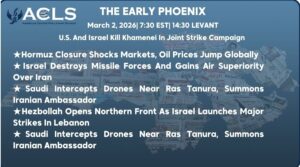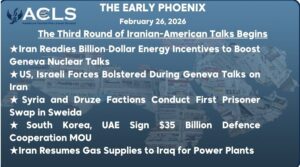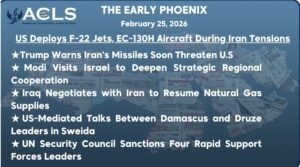THE EARLY PHOENIX
Aug 29, 2024
★ IRAN
-
Iran’s Coast Approached by U.S. Navy Aircraft Carriers
Iran’s coast is now closely approached by two U.S. Navy aircraft carriers, signaling a significant show of force regionally. The Abraham Lincoln Carrier Strike Group is in the Gulf of Oman, while the Theodore Roosevelt Carrier Strike Group is stationed nearby. The Gulf waters near Iran host nine additional U.S. Navy vessels, including the USS Spruance, USS McCain, USS O’Kane, and USS Georgia. Meanwhile, eight U.S. Navy vessels have been deployed in the Mediterranean Sea near Egypt and Israel. This deployment includes the USS Bulkeley, USS Roosevelt, and others, enhancing U.S. presence near the Suez Canal. The overall deployment of 19 U.S. Navy ships are shown in the image above.
-
Iranian Hackers Target Military Officials with Fake HR Companies Online
Iranian hackers linked to APT42 impersonated Israeli-run companies, targeting military and intelligence officials across Iran, Syria, and Lebanon. They created fake HR companies like VIP Human Solutions, using deceptive websites and social media profiles on Twitter and Telegram. The operation sought to identify individuals willing to sell secrets to Israel and other Western governments through sophisticated cyber-espionage tactics. Sensitive data, including personal details and professional histories, was gathered for future intelligence exploitation by Iranian operatives. Mandiant uncovered this operation, active since at least 2017, highlighting the significant security threat posed by these activities. Despite many accounts being removed, the collected data remains a serious concern for ongoing intelligence efforts.
-
Iranian President Vows to Lift Sanctions Through Diplomacy and Strategic Dialogue
Iranian President Masoud Bezhkian reaffirmed his commitment to lifting international sanctions through dialogue and diplomacy, aligning with Supreme Leader Ali Khamenei’s guidance. Speaking in Tehran, where Abbas Araghchi was introduced as the new Foreign Minister, Bezhkian emphasized that Iran’s diplomatic efforts will be guided by wisdom and strategic considerations. Araghchi stated the Foreign Ministry’s priority is easing economic sanctions, though this may require nuclear concessions. Despite this, the U.S. has signaled no intention to renegotiate the 2015 nuclear deal at this time.
-
Khamenei Prioritizes Strengthening Ties with Turkmenistan, Highlights Mutual Interests
During a meeting with Turkmenistan’s National Leader Gurbanguly Berdimuhamedow in Tehran, Ayatollah Khamenei emphasized that strengthening relations with Turkmenistan is a top priority for Iran. He acknowledged the significant growth in bilateral relations but noted that many opportunities for further cooperation remain untapped. Khamenei stressed that expanding ties based on mutual interests benefits both nations and expressed optimism that under President Dr. Pezeshkian, efforts to deepen these relations will continue with increased vigor and strength.
=================
★ ISRAEL-HEZBOLLAH CRISIS
-
Hezbollah Forces Target Six Israeli Military Sites
Hezbollah targeted six Israeli military sites in Lebanon’s eastern and western sectors using drones and shelling. A drone strike hit the Western Brigade headquarters near Yara settlement, while additional strikes targeted Roueisat al-Alam, Sammaqa, and Manara. These actions intensified ongoing military confrontations and highlighted Hezbollah’s strategic efforts to challenge Israeli positions within contested territories, further impacting regional stability and security. Israeli artillery and airstrikes targeted Hezbollah positions in southern Lebanon, hitting Kfarkila and Yaroun, while shelling Aita al-Shaab.
-
Hezbollah’s Failed Retaliation Highlights Inevitable Israel-Hezbollah War
Hezbollah and Israel are locked in a dangerous stand-off after the failed rocket retaliation on Tel Aviv and Israel’s preemptive strikes.Despite this, Hezbollah launched hundreds of Katyusha rockets at Israeli military sites, primarily targeting Tel Aviv, the most important city to Israel, though some reached central regions. Analysts now warn that a broader war between Israel and Hezbollah is inevitable, with diplomatic efforts failing to prevent further escalation. The U.S. is urged to prepare for this impending conflict as regional tensions rise.
-
Hezbollah Faces Growing Pressure as Lebanon’s Economic Crisis Worsens
Hezbollah now faces fierce opposition from the Lebanese population as severe financial restrictions lead to widespread unrest. In Beirut, citizens set fire to a Lebanese-French bank branch, protesting banking restrictions that prevent fund withdrawals. With bread prices expected to rise in September, Lebanon’s resilience is crumbling, heightening the risk of Hezbollah being drawn into a broader conflict with Israel.
=================
★ SYRIA
-
Syria: Israel Intercepts Drone, Strikes Hezbollah as Russia Condemns Airstrikes
Syria remains central to escalating tensions as Israel intercepted a drone from Syrian territory before it breached Israeli airspace. Israel also launched airstrikes on Hezbollah targets in Lebanon, intensifying regional instability amidst ongoing conflicts in Gaza and Syria. Following these actions, Russia’s Dmitry Polyanskiy urged the UN Security Council to end Israeli airstrikes on Syria, citing their impact on political settlement efforts. Russia’s call for action comes after an Israeli strike near Damascus targeted figures linked to the Assad regime.
-
Conflicting Reports Surround Downed Aircraft in Deir ez-Zor Desert
Hours after a drone crash in Deir ez-Zor’s Abu Khashab desert, reports emerged of another unidentified object falling nearby. Conflicting reports surfaced after the crash near Deir ez-Zor city, with Assad’s forces claiming they downed a U.S. drone. Local sources and Iranian media alleged a U.S. warplane crashed in areas controlled by Iran and Assad’s regime in eastern Syria. Iran’s IRNA, citing Al-Mayadeen, reported a U.S. fighter jet crashed in Deir ez-Zor due to technical issues, with the crew rescued.
-
Assad Continues Chemical Weapons Enrichment
The OPCW reported on August 29, 2024, that Assad’s regime continues to enrich chemical weapons stockpiles despite international efforts. The report highlighted ongoing issues with verifying the complete destruction of Syria’s chemical arsenal, citing unresolved discrepancies. Assad’s regime has been accused of carrying out 222 chemical attacks since 2012, impacting thousands of civilians. Despite these accusations, Assad continues to deny responsibility, with Russia and Iran supporting his defiance against international pressure for accountability.
-
ASSad Captagon Cartel Continues with Drone Technology
Assad’s Captagon cartel continues drug smuggling operations, now using drone technology to target neighboring countries like Jordan. Jordanian authorities intercepted Syrian-origin drones carrying Captagon in two smuggling attempts near the southern border. The Jordanian Armed Forces, working with security and drug enforcement agencies, successfully downed the drones inside Jordanian territory. The seized contraband was quickly handed over to relevant authorities for further investigation and disposal. The Jordanian Armed Forces remain vigilant in countering evolving border threats posed by Assad’s Captagon cartel. Their actions highlight a strong stance against the use of drones in drug trafficking.
=================
★ IRAQ
- Iraqi Forces Down Turkish UAV in Kirkuk, Escalating Regional Tensions
In Kirkuk, Iraqi security forces shot down a Turkish UAV, identified as an Aksungur, using the Fantasy 1 air defense system. Initial reports mistakenly identified the UAV as a Bayraktar TB2. The incident occurred near the main market area and airport road, with no injuries or damage reported. This marks a significant development as Turkey occasionally targets Kurdish positions in Iraqi territory, sometimes using UAVs.
Iraqi Oil Exports Exceed 108 Million Barrels Last Month
Iraq’s Oil Ministry reported exporting over 108 million barrels of oil in July, according to final SOMO statistics. Central and southern fields contributed 106.1 million barrels, while the Qayyarah region exported nearly 1.93 million barrels. This report highlights Iraq’s significant oil export volume for the month. The data underscores Iraq’s continued role as a major global oil exporter.
-
Islamic Resistance Group Claims Attack on Haifa Power Plant
The Islamic Resistance in Iraq claimed responsibility for a drone attack on Haifa’s power plant, Israel. Previously, they targeted U.S. bases in Iraq and Syria. In June, they also struck the Ramet David Airbase in the occupied Palestinian territories.
=================
★ ISRAEL & PALESTINIAN TERRITORIES
-
Hamas Commander Mohammed Jaber Killed in West Bank Raid by Israeli Forces
Mohammed Jaber, a Hamas commander, was killed by Israeli forces in a West Bank operation targeting militants near Ramallah. The raid resulted in the deaths of Jaber and three others, as clashes intensified in the region. Jaber, a significant militant figure, had previously spent 20 years in Israeli prisons. As Israeli forces stormed multiple West Bank locations, including Jenin and Tulkarm, tensions escalated further. The ongoing violence has resulted in over 530 Palestinian deaths since the conflict began, raising international concerns and drawing widespread attention.
-
Israel Faces Sixth Round of U.S. Sanctions Over Settler Violence
The Biden administration imposed its targeting Israeli settler violence in the West Bank, sanctioning Hashomer Yosh and Issac Levy Filant. These sanctions followed violent attacks by settlers in Palestinian towns, resulting in casualties, with no arrests made near Bethlehem. Prime Minister Netanyahu’s office expressed serious concerns, and far-right coalition lawmakers condemned the sanctions, accusing the Biden administration of antisemitic persecution. Extensive discussions between the U.S. and Israel are ongoing regarding these measures.
===============
★ YEMEN
-
Yemen: No Oil Leak Detected as Houthis Agree to Truce Following Iranian Orders
The EU mission “Aspides” confirmed no oil leak from the Greek tanker Soniun, anchored in the Red Sea. Despite recent Houthi missile attacks near Hodeidah, Yemen, the tanker remains secure, with no environmental damage detected. In a scandalous development, Iranian-backed Houthis agreed to a temporary truce, allowing European countries to tow the damaged tanker. Iran’s UN mission revealed this decision, which followed international pressure. The Pentagon reported Houthi threats against rescue efforts, while the U.S. coordinates with partners to secure the area and mitigate risks.
★ EGYPT & NORTH AFRICA
-
Egypt Criticized by Ethiopia for Military Aid to Somalia
Egypt’s recent military equipment shipment to Somalia has drawn strong objections from Ethiopia. Ethiopia accuses Somalia of collaborating with external forces to destabilize the region. This aid coincides with an African Union peacekeeping mission and aligns with Egypt-Somalia military cooperation. Ethiopia’s concerns highlight increasing tensions over the Grand Ethiopian Renaissance Dam and regional security, underscoring growing geopolitical conflicts in the Horn of Africa.
-
Egypt Sees Saint-Gobain’s French Investment Reach 160 Million Euros
Egypt’s Minister of Investment met with Saint-Gobain Egypt’s CEO to discuss the company’s recent 160 million Euro investment. The meeting focused on leveraging state incentives to expand Saint-Gobain’s activities and boost local production. The collaboration aims to enhance Egypt’s industrial capabilities and investment landscape, reflecting a strengthening partnership between Egypt and Saint-Gobain. This significant investment underscores the government’s commitment to supporting the company’s growth and increasing export potential in the region.
-
Egypt’s Sisi and Germany’s Scholz Discuss Gaza Conflict Resolution
Egyptian President Abdel Fattah el-Sisi and German Chancellor Olaf Scholz discussed strategies to end the ongoing Gaza conflict. They emphasized strengthening bilateral relations and coordinating on regional issues to prevent further violence. Both leaders agreed on the importance of collective action for stabilizing the Middle East and achieving peace in Gaza. Their dialogue reflects a commitment to addressing international challenges and working together to find effective solutions to the conflict.
-
Egypt Provoked by Netanyahu’s Philadelphi Corridor Request
Egypt reacted strongly to Israeli Prime Minister Benjamin Netanyahu’s unusual request involving the Philadelphi Corridor, a contentious border road between Gaza and Egypt. Netanyahu proposed holding a security cabinet meeting in the corridor to assert Israel’s demand for maintaining military control in the area, even during hostage deal negotiations. This proposal has heightened tensions, as Netanyahu insists on an Israeli presence to prevent Hamas from rearming, while both Hamas and Egypt demand a full Israeli withdrawal from the corridor.
=================
★ TURKIYE
-
Turkiye Hosts Summit on “Development Road” Project with Iraq, UAE, and Qatar
Turkiye is hosting a major summit in Istanbul today, with officials from Iraq, UAE, and Qatar discussing the “Development Road” project. The project aims to connect Iraq’s Basra port to Turkiye and beyond, enhancing regional trade routes. Key decisions regarding the $20 billion investment will be made at Dolmabahçe Palace, highlighting the project’s strategic importance. The UAE and Qatar are potential investors, showcasing significant economic collaboration among these nations to bolster regional connectivity and development.
-
Turkiye Urges Azerbaijan to Reconsider Its Diplomatic Ties With Israel
Turkish Foreign Minister Hakan Fidan met Azerbaijani counterpart Jeyhun Bayramov, focusing on regional developments and strategic interests. Fidan highlighted the deep fraternal relations between Turkey and Azerbaijan, emphasizing shared historical and cultural ties. The discussions included Israel’s actions in Gaza, raising concerns about the alignment of both countries’ stances. Fidan stressed the importance of solidarity between Turkey and Azerbaijan in all circumstances, whether favorable or challenging. Turkey’s position on the Palestinian issue was a key topic, reflecting concerns about regional stability and shared viewpoints.
==================
★ THE GULF
-
Oil and Gas Projects in Saudi Arabia Grow Tenfold
Saudi Arabia’s oil and gas projects surged 43% in Q1 2024, with awarded contracts reaching SAR 118.8 billion, marking a tenfold increase from last year. This represents the second-highest quarterly value since 2015. By 2023’s end, total contracts valued SAR 270.6 billion, showing strong growth. The sector saw SAR 51.2 billion awarded across 19 contracts in Q1 2024, surpassing last year’s total. The Contract Award Index hit 415.89 points, the highest since 2013, reflecting Saudi Arabia’s strategic market influence.
-
Qatar Seeks Acquisition of Russian Oil Assets in Germany
Qatar is set to acquire Rosneft’s confiscated oil assets in Germany, marking a key strategic investment. Following a Qatari delegation’s visit to Berlin, German government approval is anticipated. The deal, crucial for both parties, hinges on finalizing the transaction, potentially ending a two-year dispute over assets seized post-Ukraine invasion. The acquisition, vital for stabilizing the market amid ongoing energy crises, would bolster Qatar’s global energy influence.
-
Saudi Central Bank’s Reserves Rise 6% in July 2024
Saudi Central Bank’s reserves grew 6% year-on-year in July to SAR 1.697 trillion ($452 billion), up from SAR 1.600 trillion in July 2023, despite a 3.2% monthly decline from June’s SAR 1.754 trillion peak. Foreign financial investments increased 7% annually, reaching SAR 1.021 trillion ($272 billion). However, IMF reserves dropped 8% from June to SAR 13.2 billion. These figures reflect Saudi Arabia’s robust financial management, maintaining strong reserves despite monthly fluctuations.
-
Saudi Date Exports Reach $200 Million in First Half 2024
Saudi Arabia’s exports grew 9.9% in 2024’s first half, reaching SAR 751 million ($200 million). Exports to Brazil, Norway, Italy, and Canada more than doubled, with Germany up 91.5%, South Korea 72%, and Indonesia 50.1%. Sweden, Malaysia, the UK, Morocco, and the U.S. also saw significant increases, reflecting a strong global demand for Saudi dates. These figures highlight Saudi Arabia’s expanding agricultural export strength and growing international market presence in 2024.
=================
📌Significant Related Studies
- Israel’s Largest West Bank Operation
- Hezbollah Strikes Tel Aviv
- Ongoing Blaze of One Million Barrels of Oil
=================
🔗 Follow the latest news from the American Center for Levant Studies via Google News



